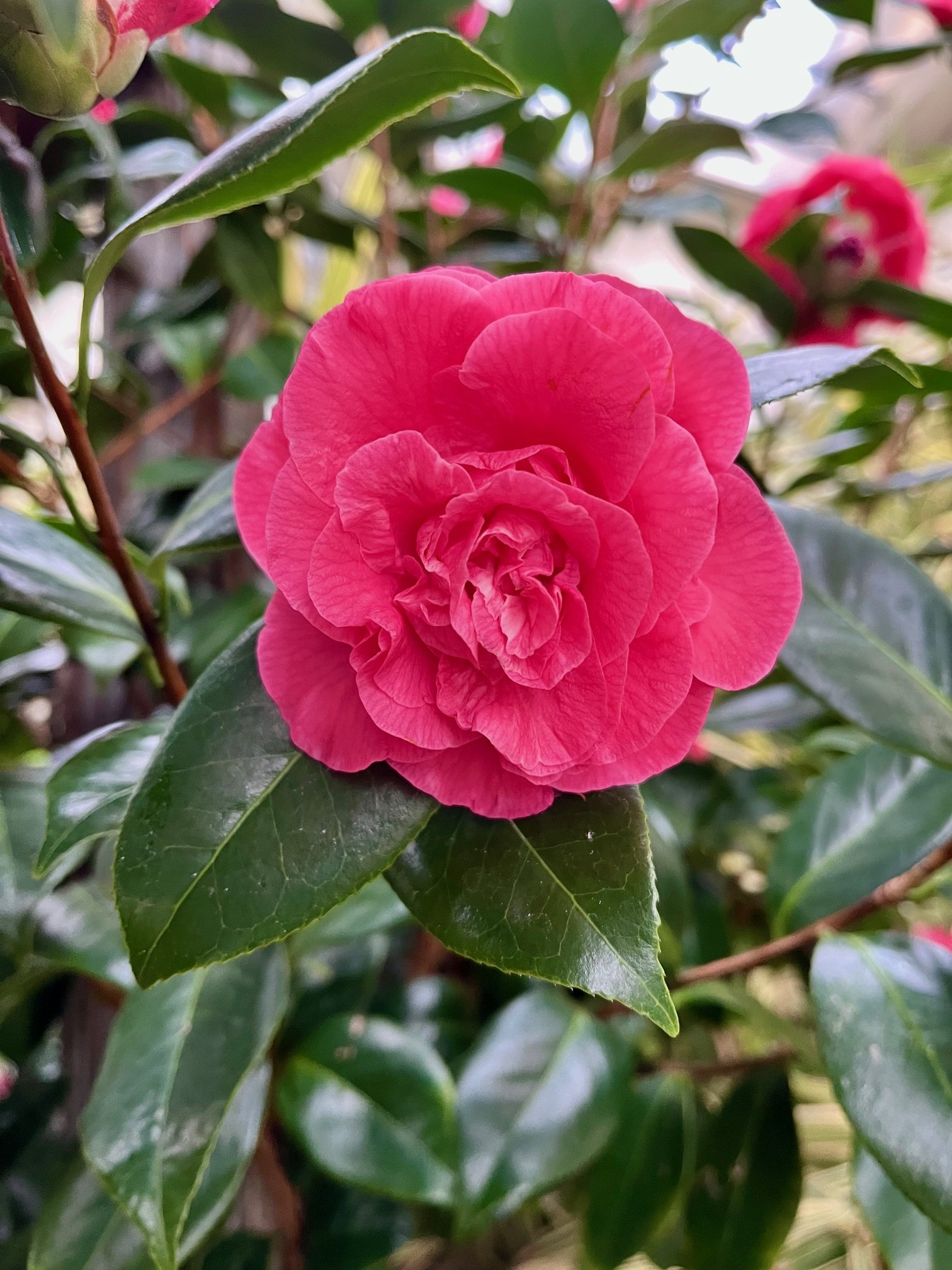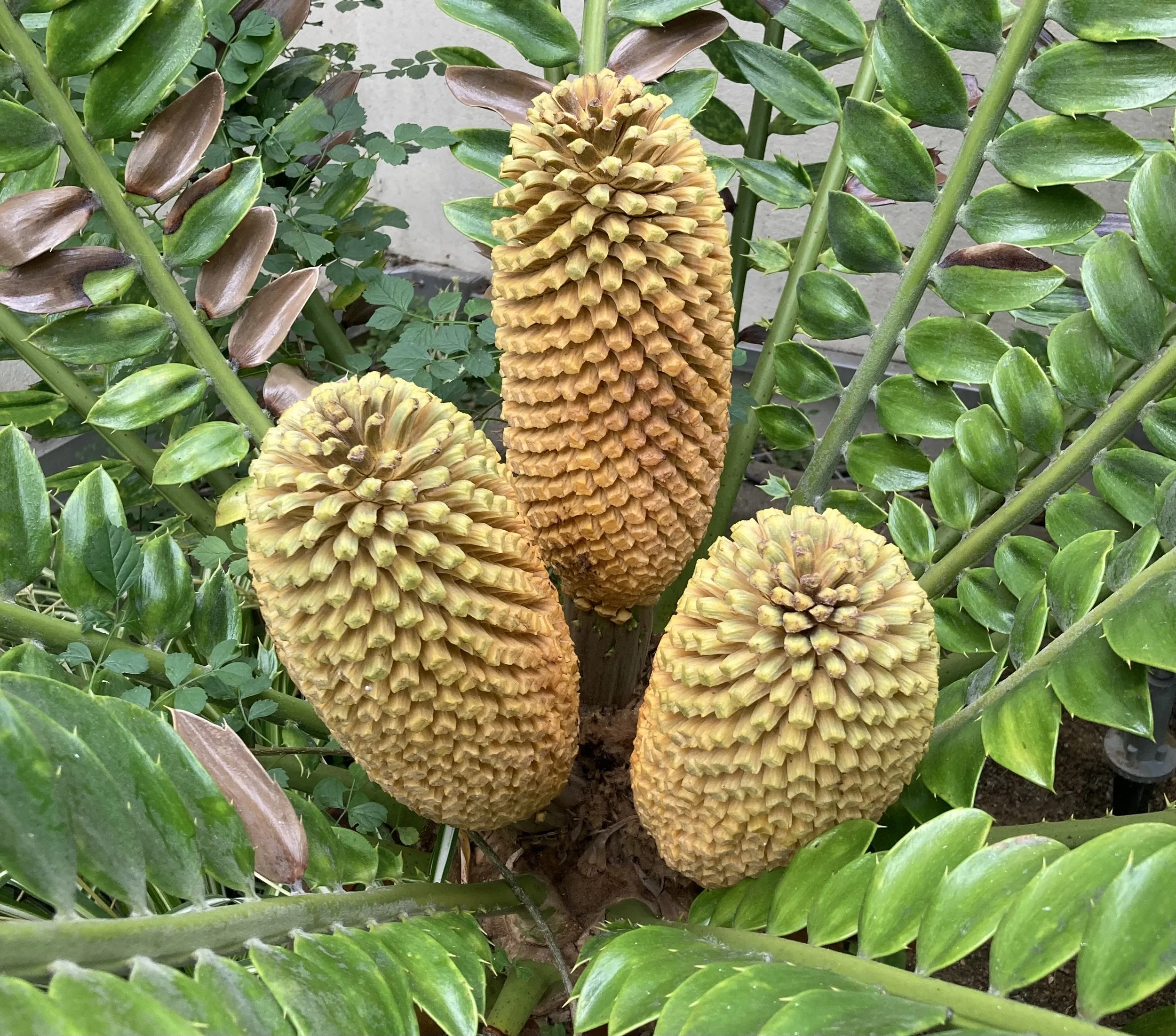Plant of the month
Each month we showcase a plant from the gardens.
Camellia japonica 'Elegans'
Nestled in the East Ridge and Furrow section of the Pavilions is Camellia japonica ‘Elegans’ a chance seedling selection of Camellia japonica ‘Anemoniflora’ made by Alfred Chandler at his nursery in Vauxhall London in 1832. In fact, Camellia japonica ‘Anemoniflora’ is growing next to ‘Elegans’.
Encephalartos natalensis
Encephalartos natalensis Natal cycad South Africa, West Dome of the Pavilions
The pinnate leaves of these spectacular plants grow from the cylindrical trunk and fall away as they age, leaving a rosette of hard new leaves with opposite leaflets on the stem, each leaflet bearing a stout sharp prickle.
Arbutus unedo
Enter the Gardens through the Clarkehouse Road gatehouse and immediately on your left nestled next to the Curator’s House, now Joni’s café, you will see a magnificent specimen of Arbutus unedo, the ‘Strawberry Tree.’ An evergreen, it is unusual in having flower and fruit at the same time, especially notable in the late autumn and early winter. An attractive and distinctive plant it was awarded the RHS AGM in 2002 and this particular example is the Yorkshire species champion.
Osmanthus heterophyllus 'Gulftide'
Commonly known as holly olive, the juvenile, spiny-edged leaves, shiny and leathery, of this evergreen shrub in the Oleaceae (olive) family, grow opposite on the stems rather than alternately as Ilex aquifolium (common holly) does. But as can be seen on this lovely specimen, planted in the Asia Garden in 2003 (near the sweet chestnut trees, west of the Rose Garden) the mature leaves can be smooth-edged, entire.
Rehmannia elata
Newly planted in the Asian area is this striking and interesting herbaceous perennial from the Hubei and Shanxi provinces in China. Rehmannia elata is commonly known as the ‘Chinese foxglove’ because the tubular bell like flowers bear a resemblance to our native foxglove. The flowers are large, bright pink to red and flare open and outward showing yellow-spotted throats that crown the tall stems.
Magnolia grandiflora 'Goliath'
Magnolia grandiflora is reckoned to be the most magnificent broad-leaved plant that can be grown outside in Britain. Here we have a lovely young cultivar, M. g. ‘Goliath’, in the magnolia triangle above the Rose Garden. The glossy undulated leaves are a perfect foil for the beautiful pure white flowers which have a delicious lemony scent. Each flower carries male and female parts which reach maturity at different times, and the shedding of the stigma can be seen before the pollen part matures.
Onopordum acanthium 'Cotton or Scotch Thistle'
A member of the Asteraceae, Onopordon acanthium known as ‘Cotton or Scotch Thistle’ has seeded itself on the edge of a bed in the Four Seasons Garden. Although noted as a biennial this must be the third year this fine architectural plant has been here. The giant vertical in any garden makes a bold statement but in the front of the border adds an exciting element of grandeur and majesty
Rosa ‘Wild Edric’
This beautiful English shrub rose is a fabulous addition to a mixed border. It produces large deep pink-mauve blooms in clusters through summer into autumn. Each pointed bud develops quickly into a semi-double flower which lasts a week, and as it matures the golden stamens are revealed, becoming available to pollinators. The profusion of roses on the 2m high bush with the healthy green foliage is a striking sight. The sweet fragrance is of old roses. Being a rugosa rose, R. ‘Wild Edric’ can be used for hedging; its incredibly prickly stems would deter even squirrels.
Rhododendron ‘Loderi King George’
As you walk up to the Bear Pit you cannot fail to notice on your left-hand side, slightly set up on the slope, this magnificent evergreen Rhododendron with its pink flower buds that open to loose trusses of about 10-12 almost pure white flowers, they are sweetly scented lily-like and around 7cms to 9cms across.
Pulsatilla vulgaris
‘Preferring full sun in well-drained soil, it makes a tidy nest of finely cut leaves, in which nestles a clutch of silken hair-covered buds, that slowly unfold wide to the sun soft violet-purple petals filled with yellow stamens.’
Rhododendron ‘Christmas cheer’
If you walk to the Bear Pit you cannot miss this stunning flowering rhododendron by the side of the path. At an eventual height and spread around 2m after 20 years, this dense shrub is covered in spectacular flowers with 8 or so in a cluster and trusses 4.5cm long.
Daphne ‘ Perfume Princess’
Daphne ‘Dapjur01’ or ‘Perfume Princess’ is a most successful hybrid of the 21st century, with arguably the sweetest and freshest of all daphne fragrances. It also has the longest flowering season and the most floriferous plants.
Lonicera x purpusii
Lonicera x purpusii is a hybrid between L. fragrantissima and L. standishii with the quality excelling both its parents. It is more vigorous as well as freer flowering, and will start up in every mild spell until spring, flowering reliably between late December and March.
Juniperus coxii
Juniperus coxii makes a very ornamental, graceful little tree of pendulous bright green leaves in whorls of three, with reddish, shredding bark.
Boenninghausenia albiflora
Commonly known as white Himalayan rue, Boenninghausenia albiflora has pungent dark green leaves divided into attractive feathery ovate leaflets, bearing loose panicles of small cup-shaped white flowers in late summer through to the autumn.
Colletia hystrix ‘Rosea’
With their distinctive and strange appearance, the Colletias will never be mistaken for other plants.
Ligustrum quihoui
As you walk towards the Mediterranean Garden passing the bearpit on your right, you will see on your left the Waxyleaf Privet, Ligustrum quihoui Carr. It cannot be missed at this time of year.
Solanum atropurpureum
For summer, the Gardens’ staff create much admired tender plant displays in the bed to the west of the pavilions and in the bed outside South Lodge on the Thompson Road drive. See in the latter bed extraordinary Solanum atropurpureum!


















